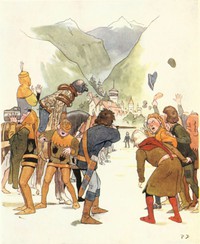William Tell Told Again by P. G. Wodehouse (web ebook reader .txt) 📗

- Author: P. G. Wodehouse
Book online «William Tell Told Again by P. G. Wodehouse (web ebook reader .txt) 📗». Author P. G. Wodehouse
And Arnold of Sewa twirled his moustache and looked offended. His friends instantly suggested that he should be allowed to try where the other three had failed, and the rest of the crowd, beginning to hope once more, took up the cry. The result was that the visitors' bell of the Palace was rung for the second time. Arnold of Sewa went in, and the door was banged behind him.
Five minutes later he came out, sucking the first finger of his left hand.
"No," he said; "it can't be done. The tyrant has convinced me."
"I knew he would," said Arnold of Melchthal.
"Then I think you might have warned me," snapped Arnold of Sewa, dancing with the pain of his burnt finger.
"Was it hot?"
"Boiling."
"Ah!"
"Then he really won't let us off the taxes?" asked the crowd in disappointed voices.
"No."
"Then the long and short of it is," said Walter F�rst, drawing a deep breath, "that we must rebel!"
"Rebel?" cried everybody.
"Rebel!" repeated Walter firmly.
"We will!" cried everybody.
"Down with the tyrant!" shouted Walter F�rst.
"Down with the taxes!" shrieked the crowd.
A scene of great enthusiasm followed. The last words were spoken by Werner Stauffacher.
"We want a leader," he said.
"I don't wish to thrust myself forward," began Arnold of Sewa, "but I must say, if it comes to leading--"
"And I know the very man for the job," said Werner Stauffacher. "William Tell!"
"Hurrah for William Tell!" roared the crowd, and, taking the time from Werner Stauffacher, they burst into the grand old Swiss chant which runs as follows:
"For he's a jolly good fellow! For he's a jolly good fellow!! For he's a jolly good fe-e-ll-ow!!!! And so say all of us!"And having sung this till they were all quite hoarse, they went off to their beds to get a few hours' sleep before beginning the labours of the day.
Chapter IIIIn a picturesque little ch�let high up in the mountains, covered with snow and edelweiss (which is a flower that grows in the Alps, and you are not allowed to pick it), dwelt William Tell, his wife Hedwig, and his two sons, Walter and William. Such a remarkable man was Tell that I think I must devote a whole chapter to him and his exploits. There was really nothing he could not do. He was the best shot with the cross-bow in the whole of Switzerland. He had the courage of a lion, the sure-footedness of a wild goat, the agility of a squirrel, and a beautiful beard. If you wanted someone to hurry across desolate ice-fields, and leap from crag to crag after a chamois, Tell was the man for your money. If you wanted a man to say rude things to the Governor, it was to Tell that you applied first. Once when he was hunting in the wild ravine of Sch�chenthal, where men were hardly ever to be seen, he met the Governor face to face. There was no way of getting past. On one side the rocky wall rose sheer up, while below the river roared. Directly Gessler caught sight of Tell striding along with his cross-bow, his cheeks grew pale and his knees tottered, and he sat down on a rock feeling very unwell indeed.
"Aha!" said Tell. "Oho! so it's you, is it? I know you. And a nice sort of person you are, with your taxes on bread and sheep, aren't you! You'll come to a bad end one of these days, that's what will happen to you. Oh, you old reprobate! Pooh!" And he had passed on with a look of scorn, leaving Gessler to think over what he had said. And Gessler ever since had had a grudge against him, and was only waiting for a chance of paying him out.
"Mark my words," said Tell's wife, Hedwig, when her husband told her about it after supper that night--"mark my words, he will never forgive you."
"I will avoid him," said Tell. "He will not seek me."
"Well, mind you do," was Hedwig's reply.
On another occasion, when the Governor's soldiers were chasing a friend of his, called Baumgarten, and when Baumgarten's only chance of escape was to cross the lake during a fierce storm, and when the ferryman, sensibly remarking, "What! must I rush into the jaws of death? No man that hath his senses would do that!" refused to take out his boat even for twice his proper fare, and when the soldiers rode down to seize their prey with dreadful shouts, Tell jumped into the boat, and, rowing with all his might, brought his friend safe across after a choppy passage. Which made Gessler the Governor still more angry with him.
But it was as a marksman that Tell was so extraordinary. There was nobody in the whole of the land who was half so skilful. He attended every meeting for miles around where there was a shooting competition, and every time he won first prize. Even his rivals could not help praising his skill. "Behold!" they would say, "Tell is quite the pot-hunter," meaning by the last word a man who always went in for every prize, and always won it. And Tell would say, "Yes, truly am I a pot-hunter, for I hunt to fill the family pot." And so he did. He never came home empty-handed from the chase. Sometimes it was a chamois that he brought back, and then the family had it roasted on the first day, cold on the next four, and minced on the sixth, with sippets of toast round the edge of the dish. Sometimes it was only a bird (as on the cover of this book), and then Hedwig would say, "Mark my words, this fowl will not go round." But it always did, and it never happened that there was not even a fowl to eat.
In fact, Tell and his family lived a very happy, contented life, in spite





Comments (0)